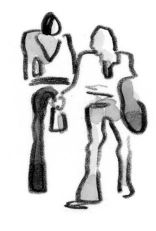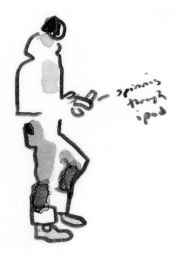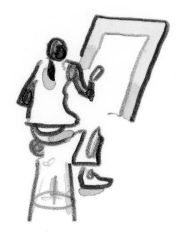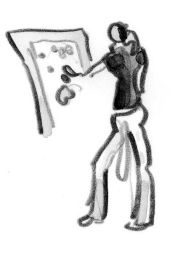Read Ridiculous/Hilarious/Terrible/Cool Online
Authors: Elisha Cooper
Ridiculous/Hilarious/Terrible/Cool (15 page)

ads
“I don't know what you want me to say.”
“Rar rar.”
“Thanks!”
“Rar rar rar!”

“I'm hurt about you too!”
“Rar rar.”
“Well, you text message me and tell me that, Carey! You did that for
no
reason.”
no
reason.”
“Rar rar rar rar.”
“You didn't give me a chance.”
“Rar.”
“My best friend!”
“Rar rar rar?”
“Well.
I'm
pissed.”
I'm
pissed.”
“
Rar
rar rar.”
Rar
rar rar.”
“You know what? You're the one person whoâ”
“Rar rar rar rar rar.”
“The only thing? The
only
thing?!”
only
thing?!”
“Rar!”
“You're talking about
me!
”
me!
”
“Rar
rar!
”
rar!
”
“Why are we still talking about
that
? We're done with that. We're
done!
”
that
? We're done with that. We're
done!
”
“Rar!”
“I'm saying like, whatever, we'reâ”
“Rar!”
“Okay, you know what? That night, when we were out, was
so
disrespectful. It's so rude to get up on someone andâ”
so
disrespectful. It's so rude to get up on someone andâ”
“Rar rar!”
“That's
not
why I'm mad!”
not
why I'm mad!”
“Rar rar rar rar rar rar rar rar rar rar rar rar rar rar rar rar rar rar rar rar rar rar rar rar rar rar rar rar rar.”
“That's
so
unfair of you to say.”
so
unfair of you to say.”
“Rar rar rar.”
“That was
a while
ago.”
a while
ago.”
“Rar rar!”
“Can
you
please apologize for that?”
you
please apologize for that?”
“Rar!”
“You stand there and attack me and you have no idea why?”
“Rar rar rar rar?”
“That's right!”
“Rar!”
“How am I supposed to talk with you?!”
“Rar rar?”
“You know what? We're
done
. We're done as friends.”
done
. We're done as friends.”
The two girls part. One up the hall, one down. Both in tears. Five minutes later, the blond girl is sitting at a table in the cafeteria with other friends. The brunette girl approaches and takes the empty seat next to her. They don't speak to each other, but they sit there together until the next bell rings.
The American and City of Chicago flags at the front door are blowing sideways in the rain, snapping like wet towels. Then the rain becomes sleet, pelting ice BBs. Then the sleet becomes walloping balls of hail-snow. Some seniors step one foot outside for lunch before thinking better of it.

The school hunkers down. Classroom windows steam up. In one cozy room on the third floor, an art class paints still lifes. The students squeeze paint out of tubes and stare at bouquets of plastic flowers. Of the thirty students in the room, eleven are listening to iPods. There's a low-level hum, one that changes depending on where one is in the room. The music shifts from emo to rap to punk, separate weather fronts of music.
Downstairs, Aisha is getting ready for her own art class.


She's in a prickly mood. She's talking about a recent episode of
Oprah.
The show was confronting taboos like premarital sex, and it made Aisha think about high school. Aisha feels there's a liberal conformity at Payton that does not tolerate other points of view. Anyone who questions the accepted line gets a what's-
wrong
-with-you stare. She feels
she's
liberal but the conformity here makes her feel conservative, or at least anti anti-conservative.
Oprah.
The show was confronting taboos like premarital sex, and it made Aisha think about high school. Aisha feels there's a liberal conformity at Payton that does not tolerate other points of view. Anyone who questions the accepted line gets a what's-
wrong
-with-you stare. She feels
she's
liberal but the conformity here makes her feel conservative, or at least anti anti-conservative.
“I feel like consensus in this school is . . . ” Aisha hesitates, gesturing with her hands as if she's trying to squeeze air into a bag. She believes she's often the only person in class who has a different opinion. This can be intimidating. Just yesterday, her English teacher told their class that media was the single biggest influence on American children today.
“I'm like,
no!
I didn't grow up that way,” Aisha snaps. “I'm
definitely
shaped by my family. And everybody else in class was convinced he's right. And I know that he says things to provoke us, but I'm like â
Why
do the kids just go along?' It's frustrating. ”
no!
I didn't grow up that way,” Aisha snaps. “I'm
definitely
shaped by my family. And everybody else in class was convinced he's right. And I know that he says things to provoke us, but I'm like â
Why
do the kids just go along?' It's frustrating. ”
Over break, Aisha drove with her family to Florida. After dropping their Pakistani grandfather at O'Hare for his flight back to Karachi, they took the rear seats out of the family van (an Oldsmobile with 200,000 miles on it), laid down some sleeping bags, and headed south.
Aisha drove at night. There was no good radio, and the CD player broke. She drove until Georgia. After her shift Aisha lay in her sleeping bag and read
A Heartbreaking Work of Staggering Genius
. Then she slept. She woke up in the driveway of their house in Palm Coast. Her grandmother was very surprised.
A Heartbreaking Work of Staggering Genius
. Then she slept. She woke up in the driveway of their house in Palm Coast. Her grandmother was very surprised.
Over the next days, Aisha swam in the ocean and lay on the beach. One night, her elder brother went out with his international friends. Aisha's parents told him to take her, so Aisha tagged along and they all ended up playing poker.
“The best part is that I won!” She giggles. “I took all of their money! I got four of a kind like four times!”
Her brother's friends knew Aisha was a novice. They kept raising the pot, trying to strong-arm her into folding. But, she says, “I don't know
how
to fold. And I wanted to see how it would turn out.”
how
to fold. And I wanted to see how it would turn out.”
The last hand came down to two players: a boy from Daytona Beach Community College, and Aisha. The community college kid was complaining, “I can't believe it's me and a
high schooler
. A girl!” But the cards kept coming, Aisha kept holding, and at the end of the hand, there they were: four sevens. She took the forty-dollar pot and treated everyone to ice cream. She got banana, her favorite.
high schooler
. A girl!” But the cards kept coming, Aisha kept holding, and at the end of the hand, there they were: four sevens. She took the forty-dollar pot and treated everyone to ice cream. She got banana, her favorite.
As Aisha talks, her earlier irritation melts. Maybe it's talking about someplace warm, maybe it's talking about her family. Their idiosyncrasies are comforting, even as they exasperate her. Fitting in with her family is never a question, a foundation that allows her to be daring in other parts of her life.
Aisha starts packing her books for class. There, inside her backpack, is a blue jersey. Aisha is trying out for the soccer team.
The temperature drops further, if that's possible. A cold that is piercing and cruel. A cold that forces those outside to come in quick, gloves on cheeks. In front of the high school, an adult parks her car, balancing a steaming cup of coffee on its roof, then knocks it over. As the coffee spills down the windshield, it is already freezing.
Anais Blake pulls the sleeves of her tight maroon shirt over her wrists and stares out the atrium window. An icy scree covers the sidewalks, frosts the cars, cakes the tree branches. Anais looks south. She wishes she were in Miami.
Over break, Anais performed there with the Cuban Classical Ballet. A friend who dances with the group invited Anais, as they needed extra dancers for their holiday performance. Anais danced in the back, mesmerized by the Cuban dancers in front of her. The Cubans were the most incredible movers she had ever seen. Just to be part of their performance was thrilling.
As Anais describes the eveningâthe Cubans leaping, the crowd standing and cheeringâher face glows. She almost chokes up. Then, in the slightest of shifts, her teary eyes turn despairing.
Being in high school is suffocating her. Anais missed a week of school when she was in Miami. She's been struggling to catch up with her schoolwork, which holds less and less relevance to her. Sometimes she wonders why she's in high school at all.
An underclassman shuffles past on his way to the bathroom, his hall pass slapping into his heels.
“If you want to dance,
dance,
” Anais says, eyes dry now. Making her feel even worse is the fact that a few days ago she hurt her ankle, again. This time, her left. She was leaping
grande allegros
across the studio floor when she felt something wrong, and fell down. She kept dancing, which wasn't smart. But in dance there is such pressure not to be injured (and not to
tell
if injured), which exacerbates injuries further. Anais had just been given a lead in her company's spring performance. When eventually she told her instructor about the sprain he was silent, shaking his head and walking away.
dance,
” Anais says, eyes dry now. Making her feel even worse is the fact that a few days ago she hurt her ankle, again. This time, her left. She was leaping
grande allegros
across the studio floor when she felt something wrong, and fell down. She kept dancing, which wasn't smart. But in dance there is such pressure not to be injured (and not to
tell
if injured), which exacerbates injuries further. Anais had just been given a lead in her company's spring performance. When eventually she told her instructor about the sprain he was silent, shaking his head and walking away.
Anais hasn't danced in two days. Her ankle is puffy. And like the last time she was hurt, she has a big audition coming up, this time for Juilliard.
There's a new folding table in the atrium. Taped to its edge is this note:
Angry? Sad? Stressed from school? Frustrated at home? We want to help.
It's a program run by a psychological institute at Northwestern University. The psychologists sit at the table, staring into space. One has been doing a crossword all morning. The other has a research paper lying in front of him entitled “Rationale for Psychological Skills . . . ” which he is not reading. It would seem that one psychological skill would be to recognize that it is not smart to set up a table advertising mental help in a place packed with students who would notice who approached the table and asked for help.
“Welcome to semester two! The last semester of school! How lovely is that?” Ms. Murphy says, seeming particularly peppy today, her curly red hair bounding around like a tetherball in a windstorm. As she circles her classroom, her belly serves as a shelf for her copy of
Crime and Punishment
.
Crime and Punishment
.
“Can I have a mandatory volunteer?” she jokes. Andy, wearing a yellow
Illinois State of aâMaize'ing Creativity
T-shirt, takes that inopportune moment to stretch, unintentionally volunteering himself. As Andy starts reading, Ben stretches and yawns and scratches himself, presenting his hairy belly to his classmates for their viewing pleasure.
Illinois State of aâMaize'ing Creativity
T-shirt, takes that inopportune moment to stretch, unintentionally volunteering himself. As Andy starts reading, Ben stretches and yawns and scratches himself, presenting his hairy belly to his classmates for their viewing pleasure.

ads
Other books
Murder on the Cliffs by Joanna Challis
Changes by Ama Ata Aidoo
The Horus Road by Pauline Gedge
Cloak of Darkness by Helen MacInnes
Hard Candy by Jade Buchanan
The Secret Society of the Pink Crystal Ball by Risa Green
Harry Putter and the Chamber of Cheesecakes by O'Donnell, Timothy R.
The Survivor by Vince Flynn
Something About Joe by Kandy Shepherd
Marked (Hostage Rescue Team Series) by Kaylea Cross